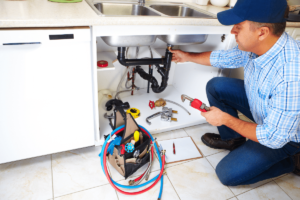A plumber is a professional trades person who installs and repairs pipes to carry water, sewage, and gas to homes, businesses, and factories. They also clean drains and repair or replace plumbing fixtures.

Plumbers are able to work with all kinds of piping, from copper to lead. Furthermore, they are required to be licensed in some jurisdictions and must undergo years of training.
The plumbing installation process is an important part of any home or commercial building. Whether you are building a new home or renovating an existing one, plumbers can help install all necessary components to ensure that everything works as it should.
They can also make sure that the pipes, fixtures, and appliances are installed properly and according to code. This will help protect your property and avoid costly damage and unforeseen problems down the road.
To begin the plumbing installation process, a plumber must determine where the water and waste lines will go and how they will connect to your current system. This will ensure that the system will be compatible and will work well for years to come.
Next, a plumber must cut the openings in your home or business for the new pipes and fixtures. They may need to remove drywall or floor tiles to do so. Once the openings have been cut, they must then install all the fixtures that will be needed.
The plumber will insert the precut pieces of copper tubing and fittings into the holes. They will then use solder to connect them together.
Once they have done this, a plumber will then connect the new supply and drain lines to the toilet. They should be able to see that the new toilet is connected to the supply line through the bottom plate of the wall, approximately 8 inches to the left of the center line.
Another way to install a toilet is to install it through the soil pipe. This will require a bit more skill than the previous option.
If you are installing the pipe through the floor, it is a good idea to install the flange. This will make it easier to attach it to the subfloor and to the toilet.
A plumber can help you with this, as they will be able to determine the right size of hole in your floor to fit the soil pipe. They will also be able to determine the right length of pipe and the correct size of the toilet flange.
Plumbers can fix a wide variety of plumbing issues, from simple leaks to complex structural damage. They can also perform routine maintenance to keep your plumbing system in good working order and to help you avoid costly repairs in the future.
Repairs can be as simple as replacing a leaking faucet or installing a new water heater. They can also be more complicated, like repairing the septic system or adding a sump pump to protect your home from stormwater flooding.
A professional plumber will know where to start, and how to proceed, so you can get your plumbing system back up and running in no time at all. They can even offer energy efficiency upgrades to help you save money on your utility bills in the long run.
The most expensive part of any plumbing job is the labor and materials used to complete the task, but this cost can vary based on your specific situation. Depending on what you need, the cost can range from a few hundred dollars to several thousand dollars.
Another factor is the size of your plumbing system and its location in your house or commercial building. The larger the system, the more likely you will need to have someone come out to make an assessment and fix a problem.
In the end, you’ll want to pick a plumber that will do the best job for your particular needs and budget. A good way to do this is by checking out their reviews, and asking questions to ensure you are getting what you pay for.
